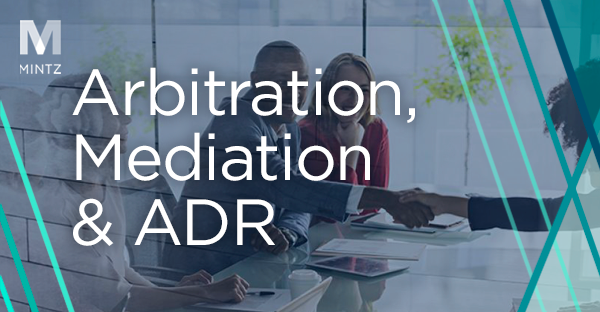
Gilbert Samberg retired from Mintz in 2021. He was previously a Member in Mintz’s Litigation Practice.
viewpoints
How to Enforce an Arbitration Subpoena: Jurisdiction and Venue Basics
February 11, 2019 | Blog
The Federal Arbitration Act (“FAA”) §7 (9 U.S.C. §7) enables arbitrators to “summon … any person to attend before them or any of them as a witness and in a proper case to bring with him or them any [document] which may be deemed material as evidence in the case.”
Read more
The Bermann Objection: Re-Thinking the “Clear and Unmistakable” Manifestation Test re Who Decides Arbitrability Issues
January 23, 2019 | Blog
Gateway issues of arbitrability are presumptively for a court, rather than an arbitrator, to decide in the first instance. First Options of Chicago, Inc. v. Kaplan, 514 U.S. 938 (1995). But arbitration is a creature of contract, and the parties to an arbitration agreement ultimately have the power to determine who is to decide such issues. Hence, that presumption may be rebutted by the parties’ clear and unmistakable manifestation of their mutual intention that an arbitral tribunal should have the exclusive authority to decide arbitrability issues in the first instance. Id.; Howsam v. Dean Witter Reynolds, Inc., 537 U.S. 77, 83 (2002). While the federal courts have been identifying examples of the practical application of those principles, many questions are still unanswered and some have barely been posed.
Read more
Judicial “Wholly Groundless” Doctrine Regarding Delegation of Arbitrability Issues is Wholly Groundless Under the FAA
January 9, 2019 | Blog
The U.S. Supreme Court has decided that the Federal Arbitration Act (“FAA”) requirement that courts enforce arbitration agreements according to their terms includes the parties’ agreement to have an arbitrator decide “not only the merits of a particular dispute, but also ‘gateway’ questions of ‘arbitrability’....” Henry Schein, Inc. v. Archer & White Sales, Inc., No. 17-1272 (U.S. Jan. 8, 2019). (As is customary, the rookie Justice (Kavanaugh, J.) delivered the Court’s unanimous opinion.) This judgment, issued little more than two months after oral argument, shatters the “wholly groundless” doctrine, which purported to enable federal courts to adjudicate gateway arbitrability issues notwithstanding the parties’ clear and unmistakable delegation of such issues to an arbitral tribunal, if the court decided that the argument for arbitrability was “wholly groundless.” (The Courts of Appeals were split on the viability of that doctrinal exception.)
Read more
New Rules of the Hong Kong International Arbitration Centre Arguably Foster Collective and Opt-In Class Arbitration
November 20, 2018 | Blog
The Hong Kong International Arbitration Centre (“HKIAC”) has promulgated a new set of Administered Arbitration Rules (“AAR”), effective November 1, 2018. Among those rules are Articles 27-30 concerning the HKIAC’s powers to join additional parties in an arbitration, to consolidate arbitrations, to consolidate related claims in a single arbitration, and to coordinate related unconsolidated arbitral proceedings. Those powers, which the HKIAC can exercise without the consents of the parties to any bilateral arbitration agreement, are not trivial; among other things, they arguably institutionalize pathways to collective or opt-in class arbitration proceedings.
Read more
Seventh Circuit Agrees That Class Arbitrability is a Gateway Question Presumptively for the Court, Then Apparently Ignores the Delegation Issue
October 30, 2018 | Blog
The Seventh Circuit Court of Appeals has joined five other Circuits in determining, unremarkably, that class or collective arbitrability is a gateway question that is presumptively for the court to decide. It then apparently ignored the issue of whether the parties delegated such arbitrability questions to an arbitrator. See Herrington v. Waterstone Mortgage Corp., No. 17-3609 (7th Cir. Oct. 22, 2018). (Yet we may infer from the Court’s decision that incorporation by reference in an arbitration agreement of the Employment Arbitration Rules of the American Arbitration Association does not constitute a clear and unmistakable manifestation of the parties’ intent to delegate the class/collective arbitrability question to an arbitrator.)
Read more
Non-Signatory to Arbitration Agreement Cannot Compel Arbitration When New York Convention Applies
October 23, 2018 | Blog
The Eleventh Circuit Court of Appeals held recently that it could not compel arbitration demanded by a non-signatory to an arbitration agreement when the New York Convention applied. See Outokumpu Stainless USA, LLC v. Converteam SAS (c/k/a GE Energy Power Conversion France SAS, Corp., No. 17-10944, 2018 WL 4122807 (11th Cir. Aug. 30, 2018).
Read more
Eleventh Circuit Adjudicates the Delegation Issue with Respect to “Class Arbitrability” No Differently Than for Bilateral Arbitration; but Who Is Bound?
October 17, 2018 | Blog
The U.S. Supreme Court has pointed out consistently in recent years that the relatively new construct of “class arbitration” is very different from your uncle’s classic bilateral arbitration. (“Class arbitration” signifies the utilization of a class action protocol (Fed. R. Civ. P. 23) in an arbitration proceeding.) One might expect, therefore, that the adjudication of issues concerning the one would differ from the adjudication of the same issues concerning the other. Delegation of the arbitrability question is one such issue. Have the lower federal courts adopted such a view? Count the Eleventh Circuit Court of Appeals as another that has decided against it, and that whether the “class arbitrability” issue has been delegated to an arbitrator should be adjudicated using the same criteria as are applied to that issue with respect to bilateral arbitration.
Read more
FLSA Collective Action Provision, Too, Does Not Make Mandatory Bilateral Arbitration Agreements Unenforceable
August 30, 2018 | Blog
In our sister blog, ADR: Advice from the Trenches, Gil Samberg explains the Sixth Circuit’s ruling, applying the Supreme Court’s reasoning in the recent Epic Systemscase, that the “collective action” provision of the FLSA does not render a collective action waiver in an arbitration agreement unenforceable.
Read more
Fair Labor Standards Act Collective Action Provision Too Does Not Make Agreement to Mandatory Bilateral Arbitration Unenforceable
August 27, 2018 | Blog
When the Supreme Court ruled recently that the “concerted activities” provision of the National Labor Relations Act (“NLRA”) did not make a contractual waiver of “class arbitration” unenforceable, it provided an extensive analysis that included comments regarding the interaction of the Federal Arbitration Act (“FAA”), the NLRA, and the Fair Labor Standards Act (“FLSA”).
Read more
After Granting a Motion to Compel Arbitration, a Court Operating Under the FAA Should Stay, Not Dismiss, the Pending Suit. And Then What?
August 13, 2018 | Blog
After granting a motion to compel arbitration, should a court operating under the FAA stay or dismiss the pending judicial proceeding? While the federal circuit courts are split on the question, the better rule seems to be that after granting a defendant’s motion to compel arbitration, FAA §4 (9 U.S.C. §4), the court should stay the judicial proceeding pending the arbitration.
Read more
News & Press
In an article published by Law360, Mintz Member Gilbert Samberg offered insights on why the U.S. Supreme Court might take up a case that arguably presents the issue of whether parties that have incorporated certain arbitral rules into their contracts have “clearly and unmistakably” agreed that an arbitrator, rather than a court, shall determine whether a matter must be arbitrated or litigated.
Prominent U.S. Appeals Court Affirms the Extraterritorial Reach of U.S. Evidence Disclosure Statute (28 U.S.C. § 1782)
February 24, 2020
In an article published by Legal Era Magazine [India], Mintz Member Gil Samberg provided insight into the increasingly popular U.S. federal statute concerning cross-border judicial assistance, 28 U.S.C. § 1782, and described a recent Second Circuit decision that expanded the reach of this discovery mechanism to evidence held outside the borders of the United States.
Mintz Member Gilbert Samberg Authors Two Bloomberg Law Articles on Class Arbitration Awards
January 3, 2020
Mintz Member Gilbert A. Samberg authored two articles, published recently by Bloomberg Law, that addressed a fundamental question concerning the legal viability of “class arbitration”: whether an arbitrator can issue an award that binds a person who is not a party to or otherwise deemed by law bound by the bilateral arbitration agreement upon which the arbitral proceeding and the arbitrator’s authority are founded—e.g., a non-appearing non-party putative class member.
A Better Specific Jurisdiction Test For Cross-Border Discovery
November 11, 2019
Mintz Member Gilbert Samberg authored this expert analysis article published by Law360 evaluating a federal statute concerning cross-border judicial assistance, Title 28, Section 1782 of the U.S. Code, which enables a district court to order a person that resides or is found within its jurisdiction to produce evidence for use in a proceeding in a foreign or international tribunal.
What is a Reasoned Award?
October 3, 2019
Mintz Member Gilbert Samberg authored an article published in the September 2019 edition of The Arbitrator, a quarterly newsletter from the Society of Maritime Arbitrators, which explained the significance of a “reasoned award” in arbitration agreements.
The Future Of Int'l Mediation After The Singapore Convention
August 29, 2019
In this Law360 expert analysis column, Mintz Member Gilbert Samberg examines the principal details of the Singapore Convention, which aims to make mediated international settlement agreements as easily enforceable as international arbitration awards now are under the New York Convention.
“Interim Measures” in Arbitration: Requiring Pre-Hearing Security for Payment of an Eventual Final Award
July 12, 2019
The Journal of Consumer & Commercial Law republished a blog post authored by Mintz Member Gilbert Samberg that addressed interim measure awards in arbitration.
Mintz Member Gilbert Samberg authored an expert analysis article published by Law360 that examined competing legal factors facing insurance arbitration disputes.
Arbitration Law And Jury Demands: Devil Is In The Details
March 25, 2019
Mintz Member Gilbert Samberg has authored this article addressing jury demand concerning issues under the FAA relating to arbitrability.
Rethinking Who Decides Gateway Arbitrability Issues
January 18, 2019
Hong Kong Rules Foster Collective, Opt-In Class Arbitration
November 15, 2018
Gil Samberg, a New York-based Mintz litigator, authored this Law360 "Expert Analysis" column discussing new rules from the Hong Kong International Arbitration Center which provide noteworthy institutional means for joinder of parties and consolidation of proceedings so as to effectuate collective or opt-in class arbitration proceedings.
Class Arbitrability Questions After 11th Circ. JPay Ruling
October 16, 2018
New York Litigation Member Gil Samberg authored this Law360 column taking an in-depth look at whether the Eleventh Circuit’s recent decision in JPay v. Kobel correctly addressed the issue of “clear and unmistakable” consent when it comes to the delegation of class arbitrability. Gil further addresses another issue relating to the decision with respect to many class arbitration-related matters
This Law360 Expert Analysis column, authored by New York Litigation Member Gil Samberg, notes that the U.S. Supreme Court will decide next term whether an arbitration agreement that says nothing about class arbitration can be interpreted to constitute consent by the parties. Gil’s column states that it is currently unclear if the Supreme Court will specify who can actually decide that question.
Kavanaugh's Views On Arbitration Could Soon Be Tested
July 25, 2018
This feature article discusses U.S. Supreme Court nominee D.C. Circuit Judge Brett Kavanaugh's track record on international arbitration. New York Litigation Member Gil Samberg is among those sources quoted in the piece.
Delineating When Arbitrability May Be Delegated
June 22, 2018
Validity, enforceability and scope of an arbitration agreement are "gateway" arbitration issues that can be delegated to an arbitrator if the agreement clearly and unmistakably indicates the parties’ intention to do so. New York Litigation Member Gil Samberg authored this “Expert Analysis” column discussing the questions that arise when one of the named arbitration parties is not a signatory of the agreement.
This column is authored by New York Litigation Member Gil Samberg. In the piece Gil discusses why parties should consider incentivizing an adversary with a “sealed settlement offer,” which could eventually make a settlement offeree pay a heavy price in such costs for miscalculation or intransigence.
2nd Circ. Courts Dive Into 'Class Arbitration' Questions
February 15, 2018
Gil Samberg, a Member in Mintz’s New York office, published an article in Law360 on February 15th on the recent efforts made by Second Circuit courts to begin grappling with issues surrounding the viability of class arbitration in U.S. jurisprudence, something the Supreme Court has yet to do.
Hot-Tubbing of Experts in Arbitration
August 28, 2017
Gil Samberg, a Member of the Litigation Practice in Mintz’s New York office, authored an article on how the “hot-tubbing” of experts – “a procedure for the contemporaneous presentation of competing expert oral testimony” – is now a fairly standard consideration in arbitrations.
Gil Samberg, a Member of the Litigation Practice in Mintz’s New York office, authored a Law360 article in conjunction with a recent series of questions asking whether class arbitration is ultimately viable in U.S. court proceedings.
The Current State Of 'Class Arbitration' Law
June 12, 2017
Gil Samberg, a Member of the Litigation Practice in Mintz’s New York office, authored a Law360 article as part of a series asking whether ‘class arbitration’ is ultimately viable, an issue that has yet to be addressed by the U.S. Supreme Court.
Bloomberg BNA Class Action Litigation Report Class Arbitration: Business Kryptonite or ADR Unicorn?
May 2, 2017
This article notes that it's common for consumer and employment contracts to have arbitration clauses that require any dispute to be resolved in binding arbitration. It further discusses how not all such clauses explicitly ban arbitration on a classwide basis.
Is 'Class Arbitration' An Oxymoron?
April 23, 2017
Mintz Litigation Member Gilbert Samberg authors this column asking the question if “class arbitration” is viable given the essential nature of arbitration, or is it an oxymoron.
Applying 28 USC § 1782 In The 2nd Circ.
January 23, 2017
New York Litigation Member Gil Samberg discusses the applications and ramifications of 28 USC § 1782 after a decision in Second Circuit Courts, holding that the London Maritime Arbitration Association is a “foreign tribunal” within that law.
Rules of the Road for Using Experts in International Arbitration
December 21, 2016
Gil Samberg, a Mintz Member, authored an article in Corporate Counsel discussing the complexity of acquiring expert evidence in arbitration disputes. Gil addresses how one must plan accordingly for that expense and difficulty.
Drafting A Sensible And Effective Multistep ADR Provision
December 12, 2016
Gil Samberg, a Member of Mintz's Litigation Practice, published an article in Law360 providing “practical advice regarding factors to be accommodated in fashioning multistep alternative dispute resolution (ADR) provisions.”
Pros And Cons Of Hot-Tubbing In International Arbitration
December 1, 2016
Gil Samberg, a Member of the Mintz Litigation Practice, authored an article in Law360 discussing “hot-tubbing” – a procedure for the joint presentation of expert testimony. Gil weighs in on the pros and cons of this procedure in international arbitrations.
Events & Speaking
Speaker
Read less
Sep
19
2016



